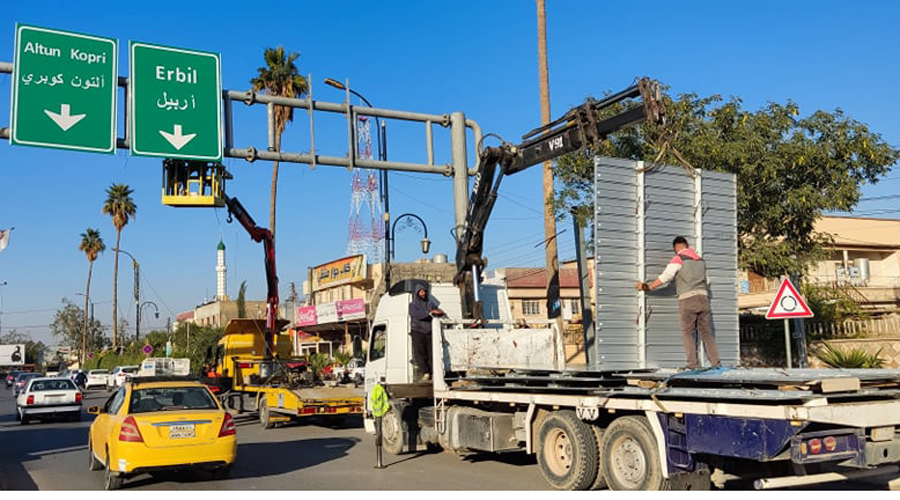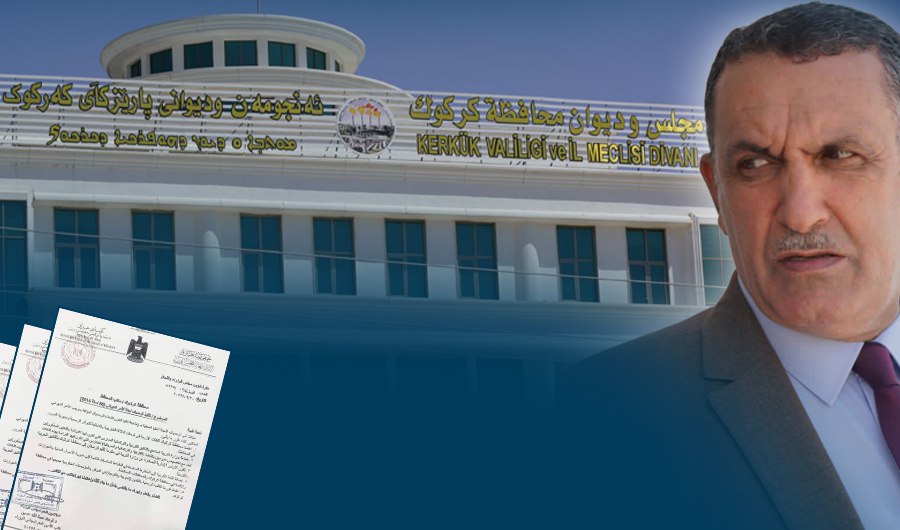The General Secretariat of the Iraqi Council of Ministers stressed the adoption of the four official languages in Kirkuk (Arabic, Kurdish, Turkmen and Syriac) in the indication boards of government departments in Kirkuk Governorate.
The instructions came in a letter by the General Secretariat of the Council of Ministers addressed to the office of Rakan Saeed al-Jiburi, Acting Governor of Kirkuk, in which reference was made to the recommendations of the Supreme Committee concerned with following up the implementation of the Official Languages Law.
The letter, issued on February 20, 2023 and published by the semi-official Iraqi News Agency INA, stresses the necessity of adopting the four official languages of the governorate in the external and internal signs of official departments and the Traffic Directorate in the governorate.
The lette elaborates that the Ministry of Education should print the curricula in the Kurdish and Turkmen languages for schools in which the study is in these languages, in addition to providing teachers of the Kurdish, Turkmen and Syriac languages for the schools which teach in these three languages.
Another paragraph of the letter indicated that the administrative orders and letters issued by the Ministry of Education in the Kurdistan Regional Government KRG to the Kirkuk Governorate should be in both Arabic and Kurdish.
The letter also stressed the addition of the Kurdish language to the approved fonts for printing computers of the Directorate of Civil Status, Passports and Residence in Kirkuk.
According to the permanent constitution of Iraq, Arabic and Kurdish are the two official languages of the country, and both Turkmen and Syriac are official languages in the administrative units where those ethnicities live.
The northern oil-rich city of Kirkuk, located 238 kilometers north of Baghdad, is an ethnically mixed province for 1,7 million Kurds, Sunni and Shiite Arabs, and Turkmens. It has long been at the center of disputed territories between Baghdad and Erbil.
Kurds were holding the senior position in Kirkuk including governor of Kirkuk up to October 2017 when the Iraqi troops ousted the Kurdish forces following declaration of victory over the Islamic State in Iraq and Levant ISIL.

Kirkuk, December 2, 2022- Signs recently installed in Kirkuk were removed following protests over the new signs with Arabic and English scripts only, skipping Kurdish, Turkmen and Syriac. Karwan Salihi
The letter by the Council of Ministers called for the adoption of formal correspondence in both Arabic and Kurdish languages in all government departments and institutions in Kirkuk.
This step came after previous controversy and criticism about not adopting the languages of the four components of Kirkuk in public signs and official letters.
In August 2022, the Iraqi Ministry of Health instructed, in a letter addressed to the Kirkuk Health Department, to adopt the Arabic language only in issuing health licenses for laboratories, shops, and public places, as information on licenses issued by the Kirkuk Health Department was written in both Arabic and Kurdish.
The Office of the Presidency of the Republic, based on “the request of the citizens of Kirkuk,” requested, in a letter issued in September 2022, the Ministry of Health to adopt the Kurdish language in codifying and issuing official documents, as stated in the constitution.
On August 31, 2021, the Kirkuk governorate administration had requested, in an official letter, all state departments in the governorate to adopt the local Kirkuk languages (Arabic, Kurdish, Turkmen and Syriac) in official correspondence.
Turkmens, the third largest ethnic group in Iraq after Arabs and Kurds, are spread across the country, residing almost exclusively in the northern towns and villages stretching from Tal Afar through Mosul, Erbil, Altun Kopri, Kirkuk, Tuz Khurmatu, Kifri and Khanaqin. They are all Muslims, half Sunnis and half Shiites.
Though there are no official records about the Turkmens in Kirkuk, Turkmen political parties say there are over 200,000 Turkmen voters in Kirkuk which has been divided into three constituencies for 12 seats in October 10th, 2021 General Elections.
Turkmen political parties have gathered only 100,000 votes in May 2018 elections in Kirkuk and has earned three seats in 2018 yet dropped to only two seats in 2021 Elections.
Early last year, signs were installed in one of the streets of Kirkuk written in Arabic and English only, which sparked a wave of protest on social media platforms, to be removed on the same day, before being reinstalled in the Arabic, Kurdish and Turkmen languages.
The Iraqi constitution stipulates that the Arabic and Kurdish languages are two official languages approved for the issuance of official documents. Paragraph (c) of that article states that the recognition of official documents and correspondence and the issuance of official documents are in both languages.
With regard to other languages, the article states that "the Turkmen language and the Syriac language are two other official languages in the administrative units in which they form a population density."





